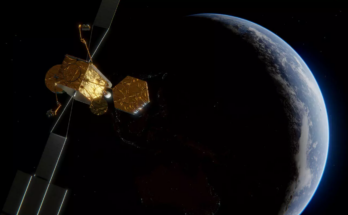By Bill Ostrove, Space Systems Analyst, Forecast International.
Cybernaut, a Chinese investment fund, has signed an agreement with Russian satellite builder Dauria Aerospace to provide $70 million in financing. Under the agreement, the two companies will form a joint venture called UrbanObserver, based in Hong Kong, which will develop 10 remote sensing satellites to conduct daily imaging of the 100 largest cities in the world. The agreement was signed at the second Chinese-Russian Expo, in Harbin, China.[i]
The 0.7-meter resolution satellites will be based on Dauria’s Auriga, which is a standardized platform that measures 246 x 246 x 545 mm (9.7 x 9.7 x 21.5 in) and has a launch mass of about 15 kilograms (33.1 lb). Satellites based on the Auriga will have a lifespan of about three years. The first Auriga satellite will launch in 2017.[ii]
The satellites will primarily be used to observe large cities, but will also monitor forests, farmland, mines, and transportation infrastructure. That imagery could eventually be used to support the new Silk Road, a planned trade route stretching from Shanghai to Western Europe. One of the keys to the Silk Road is turning Xinjiang Province capital Urumqi into a regional trade hub.[iii] China has already set aside $40 billion to build roads, bridges, and airports near its border with Kazakhstan to support the project, and President Xi Jinping says the project could generate $2.5 trillion in trade over the next 10 years.[iv]
Satellite imagery will be useful in planning and building the new infrastructure. An October 13 article in Russia Beyond The Headlines (RBTH) sums up expectations for the satellite project, stating, “According to Alexey Belyakov, executive director of the space technologies and telecommunications cluster at the Skolkovo center that gave $5 million to the development of Dauria’s micro-satellite platform, the project will evaluate the development of the Silk Road’s infrastructure. This includes the size of the populations, as well as the pace and quality of construction.”
The project will likely require additional funding rounds in order to fully deploy the network. Similar U.S. ventures have raised more than the $70 million currently available to UrbanObserver. Before it was purchased by Google, Skybox Imaging raised $91 million in three rounds, and with its deep pockets, Google has likely contributed much more than that since it closed the purchase in August 2014. Meanwhile, independent company Planet Labs has raised $183.1 million in five funding rounds to support development of its small satellites.[v]
The close relationship between companies and governments in both Russia and China is an important factor with regard to future funding of the UrbanObserver project. Considering the importance of UrbanObserver to China’s Silk Road project, the Chinese government will likely contribute funding to satellite development and construction, ensuring that the project will proceed.
Even with the project likely to move forward, it is unclear when the satellites will be deployed. Dauria indicates on its website that the Auriga’s development time is one year. With the first Auriga-based satellite planned to launch in 2017, the UrbanObserver fleet could begin to be deployed in 2018. It will likely be deployed rapidly, since SmallSats can be built more quickly than their larger cousins. The 10-satellite network could be completed by the early 2020s.
[i] http://rbth.com/science_and_tech/2015/10/13/70_mln_russian-chinese_satellite_project_will_monitor_life_i_50027.html
[ii] http://eng.dauria.ru/auriga-platfopm/
[iii] http://www.telegraph.co.uk/news/worldnews/asia/china/8113457/China-builds-a-new-Silk-Road-to-pave-over-its-troubles.html
[iv] http://www.telegraph.co.uk/finance/economics/11721211/Chinas-bid-to-tame-its-wild-west-with-a-new-Silk-Road.html
[v] http://www.crunchbase.com/organization/planet-labs#/entity
A military history enthusiast, Richard began at Forecast International as editor of the World Weapons Weekly newsletter. As the Internet grew in importance as a research tool, he helped design the company's Forecast Intelligence Center and currently coordinates the EMarket Alert newsletters for clients. Richard also manages social media efforts, including two new blogs: Defense & Security Monitor, covering defense systems and international issues, and Flight Plan, which focuses on commercial aviation and space systems. For over 30 years, Richard has authored the Defense & Aerospace Companies, Volume I (North America) and Volume II (International) services. The two books provide detailed data on major aerospace and defense contractors. He also edits the International Contractors service, a database that tracks all the contractors involved in the programs covered in the FI library. More recently he was appointed Manager, Information Services Group (ISG), a new unit that encompasses developing outbound content for both Forecast International and Military Periscope.




